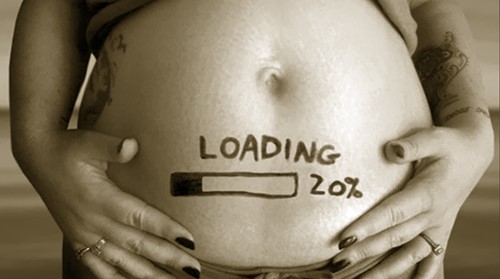I’m pregnant, now what? Navigating your first trimester

🎉Congratulations 🎉you're pregnant! The results of one simple test can turn your whole world upside down and leave you wondering what on earth to do next. Don’t sweat it. From supplements and LMCs through to diet and lifestyle, here’s some advice to help you recover your compass, and navigate your way forward.
You’re fresh out of the bathroom clutching a stick sporting a line/symbol so loaded with significance it could be a sacred hieroglyph. You’ve checked it, and checked it again, and the message is clear: you are hosting a tiny person in the hidden depths of your being. A new life depends on you – possibly even more than one (although you won’t yet be ready to contemplate multiples), just as one day, a new life may well depend on them. You are a Russian doll, taking on a whole new role in the chain of life, and this, you’ll agree, is worth celebrating. It’s still okay to jump, so jump for joy if you feel the urge. And it’s still okay to pop a bottle – just check it’s non-alcoholic, and that you remembered to wash your hands. (You’ll perfect the art of peeing on a stick over the coming months, although it only gets more difficult the larger your belly becomes.)
You may feel like screaming the results from the rooftop. This is normal. You may also feel like telling next to no one, as you try to get your head around the magnitude of this responsibility. This is also normal. Take your time to process it in your own unique way, and seek out a trustworthy confidant if you need to talk it all through. If you are releasing your news to the grapevine, or considering who to tell, it helps to be aware that miscarriages affect one in every four pregnancies, and 99% of miscarriages occur in the first trimester. Some women are more reluctant to share their news when they hear these statistics, others are unfazed. Everyone is different, ultimately it’s your call.
You may well be wondering whether you should now pay a visit to your doctor. This is a good idea if this is your first pregnancy and/or you have any concerns, questions or pre-existing conditions you need to discuss. They can also take a blood test to confirm your pregnancy. However, home pregnancy tests are 99% accurate, so a blood test is not a necessity. If you’re feeling healthy and confident, it’s not essential to pay your GP a visit. It is highly recommended, however, you take on board the following advice.
- Take folic acid and iodine
New Zealand’s Ministry of Health urges mothers to take additional iodine and folic acid before and during pregnancy, and iodine when breastfeeding, to help avoid neurodevelopmental problems in their babies. Women considering pregnancy, who are pregnant, or who are breastfeeding are recommended to take an iodine supplement each day containing 150mcg of this trace mineral. Iodine is important for optimal foetal and infant brain development, including their IQ later in life. The MOH also recommends that one folic acid tablet (0.8mg) be taken daily for four weeks before conception through to 12 weeks after becoming pregnant, to help prevent neural tube defects in their babies.
In a recent University of Otago study, researchers revealed barely more than one-third of the Kiwi mothers surveyed reported adhering fully to these recommendations. We need to turn this around and help spread the word. Take iodine and folic acid as soon as you can. Both are available at pharmacies, and can be bought at a lower cost if prescribed by your midwife or doctor.
- Find and book an LMC
LMC stands for Lead Maternity Carer – the professional contracted through the MOH to provide or organise maternity care for pregnant women and their families. This can be a midwife, an obstetrician or a GP, however, GPs providing maternity care are few and far between these days. Most women like to ask friends and family for recommendations. Alternatively LMCs can be found by calling 0800 MUM2BE.
Potential LMCs will want to know your due date. Go to ohbaby.co.nz/pregnancy/due-date-calculator/ and we’ll help you figure this out. It’s worthwhile lining up a few questions for a potential LMC to ensure you’re on the same page – eg childbirth philosophies, availability, backup carers, costs, intervention rates and whether you’re planning for a natural or home birth (we've got some great ones here). Keep in mind that midwives can refer you to an obstetrician if complications occur, but many women still opt for an obstetrician as their LMC because within the public hospital system there can be challenges in providing continuity of medical care, convenient appointments and easy access to advice out of hours.
If you choose a midwife, your first appointment will be around week ten, and you can expect scans around week 12 and 20. Scans with obstetricians are more regular. Whatever way you’re leaning, we recommend you start looking for an LMC as soon as possible. We have some great questions for you to ask your potential LMC here, and great tips for choosing an LMC, and info to help you understand whether to choose an obstetrician or a midwife - which is right for you?
- Modify your diet
OHbaby! nutritionist Hannah Gentile recommends focussing on nutrients in pregnancy – choosing plenty of fruit, vegetables, whole grains and proteins. She advises to opt for lean choices of meat, good fats such as Omega-3s, and to cut back on refined sugars. The MOH recommends avoiding some foods during pregnancy, the following list of foods, as they are more likely to cause food poisoning: processed meats (unless over 70C); cold pre-cooked poultry; raw milk products; soft cheeses; pre-prepared or unrefrigerated salads; hummus and tahini; raw egg; raw, smoked or pre-cooked fish or seafood; soft-serve ice cream; and cream or custard.
- Make healthy lifestyle choices
This means plenty of sleep, resting when you’re tired, and keeping up regular mild to moderate exercise. Not only will exercise keep you fit and give you strength for labour, it will help you avoid excess weight gain and reduce the risk of high blood pressure, diabetes and other complications. You also need to ditch cigarettes and alcohol. These increase the risk of miscarriage, brain damage and other birth defects. Seek help with this, if necessary. The sacrifice is well worth it!
|
THINKING AHEAD: THE SENSIBLE STUFF
|
|
|

AS FEATURED IN ISSUE 40 OF OHbaby! MAGAZINE. CHECK OUT OTHER ARTICLES IN THIS ISSUE BELOW


 THINKING AHEAD: THE FUN STUFF
THINKING AHEAD: THE FUN STUFF














